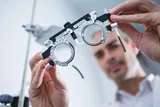Take care of your vision
Visit your optician regularly to have your eyes examined. In between examinations, if you notice a change in or are concerned about your eyesight, contact your nearest Hoya Vision optician.
Hoya Vision lenses offer vision correction and its coatings/treatments can also protect your eyes. Detecting and treating problems early can help maintain good vision for the rest of your life.








